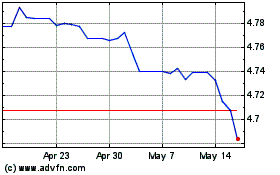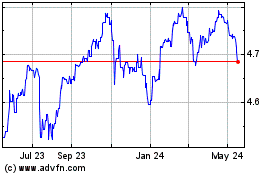Eurozone Lending To Households Logs Weakest Growth Since 2015
February 27 2024 - 12:48AM
RTTF2
Lending to the euro area households grew at the slowest pace
since 2015 and broad money supply posted a marginal growth in
January, data released by the European Central Bank showed on
Tuesday. Adjusted loans to households registered an annual increase
of 0.3 percent, which was slower than the 0.4 percent rise in
December. This was the weakest growth since early 2015.
Likewise, annual growth in loans to non-financial corporations
softened to 0.2 percent from 0.5 percent, data showed. Lending
increased for the second straight month.
Loans to the overall private sector grew 0.4 percent but it was
slightly slower than December's 0.5 percent gain.
Credit to euro area residents dropped 0.4 percent, following a
0.5 percent fall a month ago. Credit to the private sector logged a
steady growth of 0.4 percent in January.
Data showed that the monetary aggregate M3 expanded 0.1 percent
annually, weaker than the revised 0.2 percent rise in December.
The narrow measure M1, that comprises currency in circulation
and overnight deposits, declined 8.6 percent from a year ago in
January after easing 8.5 percent in December.
For the European Central Bank, today's data confirms that the
worst impact of higher rates on bank lending and money growth seems
to be over, said ING economist Bert Colijn.
This suggests that there is no immediate need to rush towards
rate cuts, the economist noted. Colijn expects the ECB to hold
rates in the coming two meetings, and sees the first cut in
June.
US Dollar vs MYR (FX:USDMYR)
Forex Chart
From Feb 2025 to Mar 2025

US Dollar vs MYR (FX:USDMYR)
Forex Chart
From Mar 2024 to Mar 2025
